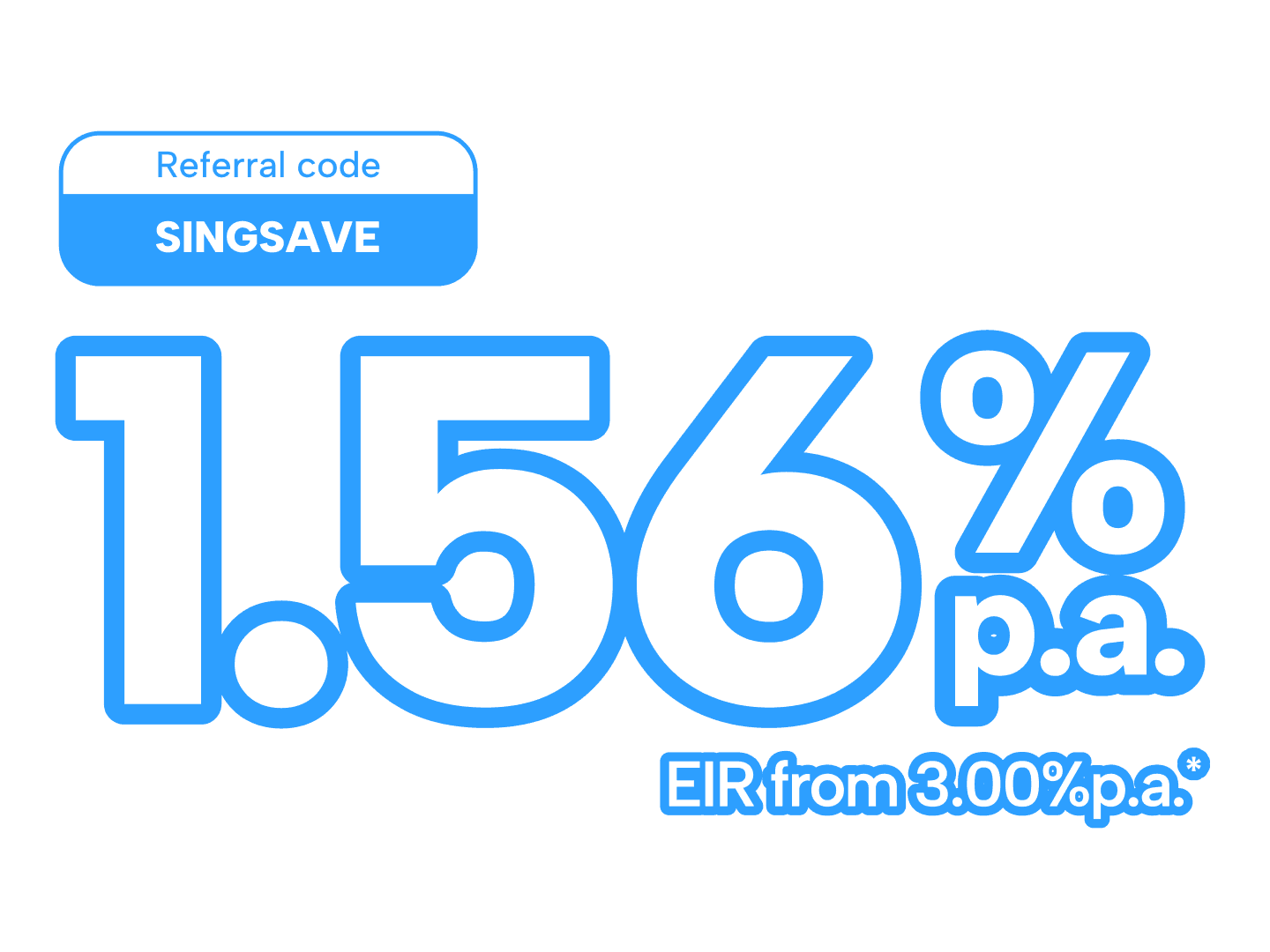Roof Replacement Cost in Singapore in 2025
Updated: 12 Dec 2025
On average, roof replacement costs in Singapore range from S$8,000 to S$30,000. Several factors influence this wide price range, including the type of roof, total surface area, materials used, and the complexity of the installation. For instance, a steeply pitched roof or one made from premium materials like slate or metal can drive costs up significantly compared to a flat roof with asphalt shingles.
In this guide, we’ll break down the major cost components, explain why prices vary so much, and explore your financing options if you’re not planning to pay the full sum upfront. Whether you’re upgrading for safety, aesthetics, or property value, SingSaver is here to help you navigate the process — and your budget — with clarity.
>> Read more: Average cost of home renovations in Singapore
Discover the best financing options for your home renovations.
SingSaver helps you compare home renovation loans in Singapore to find the right fit for your needs
SingSaver Personal Loans Cashback Offer
Enjoy interest rates as low as 1.08% p.a. (EIR from 2.09% p.a.) and up to S$1,900 in cashback when you apply for a personal loan via SingSaver. Valid till 1 March 2026. T&Cs apply.
Understanding roof replacement costs in Singapore
Knowing how roof replacement costs are broken down can help you budget smarter and spot areas where you might be able to trim expenses before committing to a contractor.
Roof size — S$5,000 to S$18,000 per 1,000 square feet
While many Singapore homes feature roof sizes ranging from 1,000 to 2,500 square feet, actual measurements can differ from interior floor plans, especially for multi-storey homes or properties with pitched or complex layouts.
You can expect to spend anywhere from S$5,000 to S$18,000 per 1,000 square feet, depending on the materials chosen and the complexity of the roof design. The average roof replacement cost per 1,000 square feet typically falls around S$7,500 to S$12,500.
Additionally, roof height plays a role. A taller home means more scaffolding, stricter safety protocols, and longer working hours, all of which increase the overall labour cost.
|
Roof size (sq ft) |
Estimated cost (S$) |
|
1000 |
S$5,000 to S$18,000 |
|
1500 |
S$7,500 to S$25,000 |
|
2000 |
S$10,000 to S$32,000 |
|
2500 |
S$12,500 to S$40,000 |
|
Source: Sp Roofing Contractor |
|
Materials — S$4 to S$30 per square foot
Roofing material is the second biggest contributor to your budget. In Singapore, you'll find roofing options like metal, clay tiles, asphalt shingles, and increasingly, solar-integrated panels. You'll find that these roofing materials come at different prices, and each has a different expected lifespan.
Here are the general prices for the most common roofing materials:
|
Material type |
Cost per sq. ft (S$) |
Lifespan |
|
Asphalt shingles |
S$5 to 10 |
15 -20 years |
|
Metal roofing |
S$10 to 20 |
30-50 years |
|
Concrete tiles |
S$10 to 15 |
30-50 years |
|
Clay tiles |
S$15 to 25 |
50+ years |
|
Source: Sp Roofing Contractor. |
||
Labour — S$150 to S$250 per hour
Labour charges in Singapore vary depending on contractor experience and job complexity. On average, roofing specialists charge between S$80 and S$120 per hour. Labour typically accounts for 60% to 70% of your roof replacement cost, with the material making up the rest.
Simpler roof structures — such as single-slope or flat roofs — are generally quicker and more affordable to replace. In contrast, properties with pitched roofs, extensions, chimneys, or dormer windows require more labour and technical skill, which can push up your final bill.
If your roof replacement isn't time-sensitive, consider scheduling the work during the off-peak season (such as the post-monsoon months). Contractors may offer more competitive rates when demand is lower.
>> Read more: Home assistance plan vs home insurance
Roof angle — depends
Roof pitch or slope can significantly influence your total replacement bill. The steeper the roof, the more dangerous the work — this raises both the time required and the risk involved.
In Singapore, most pitched roofs have a slope of 20 to 35 degrees. Anything beyond 35 degrees often incurs an additional 15% to 30% increase in labour charges.
For example:
-
Low slope (below 20°): Minimal labour surcharges
-
Mid slope (20°–35°): Standard costs
-
High slope (above 35°): Higher safety costs and slower installation
>> Read more: 5 cost-saving tips for home renovations in Singapore
Other factors to keep in mind
Aside from size, materials, and labour, there are a few more things that can impact the cost of roof replacement:
-
Permit fees: Depending on your renovation scope, some roofing projects require approval from the Building and Construction Authority (BCA) and may incur associated fees. Homeowners should consult with their contractor and refer to the BCA website for accurate fee information.
-
Old roof removal: If your existing roof needs to be dismantled before installing the new one, expect additional charges from your contractor. This covers dismantling, manpower, and haulage.
-
Waste disposal: Most contractors include basic debris disposal in their quote, but for heavier or non-standard materials, additional costs should be factored in for transportation to disposal or recycling sites.
-
Structural repairs: If damage like wood rot, rusted metal frameworks, or water infiltration is found beneath the old roof, structural repair work may be necessary. The cost of these repairs can vary widely, and the quoted S$300 to S$2,000 range is an estimate for moderate repairs; extensive damage can result in higher costs.
-
Warranty coverage: While manufacturers often provide warranties on roofing materials, some contractors may offer workmanship warranties. It's important to clarify the terms and costs of any contractor-provided warranty, as these can vary. Homeowners should prioritise understanding the manufacturer's warranty on the materials.
If you're a homeowner in Singapore planning a roof replacement, you'll find several financing choices beyond paying upfront.
>> Read more: How long do renovations take in Singapore?
⚡SingSaver x Trust Personal Loan Flash Deal⚡
Enjoy low interest rates from 1.56% p.a. (EIR from 3.00% p.a.) plus up to S$1,750 in cashback and rewards when you sign up for Trust Bank Personal Loan via SingSaver. Plus, receive a S$10 FairPrice E-Voucher from Trust when you sign up with the referral code SINGSAVE. Valid till 1 March 2026. T&Cs apply.
Financing options for roof replacement in Singapore
Not planning to pay for your new roof entirely out of pocket? While some contractors may offer instalment plans for 6 to 12 months through credit card partnerships, Singapore homeowners also have other financing options to manage this cost more comfortably.
Financing options for roof replacement in Singapore
A home equity loan is a type of secured financing where you borrow a lump sum against the appraised value of your property. It’s typically repaid through fixed monthly instalments over a period of five to 30 years, making it a predictable and structured way to finance a major renovation like roof replacement.
These loans are only available to private property owners who have substantial equity built up in their homes.
Interest rates for home equity loans tend to be lower than those of unsecured loans because the loan is backed by collateral. However, this also means that your property is at risk if you default on payments, so careful budgeting and repayment planning are essential.
Personal loans offer more flexibility than renovation loans, making them suitable for homeowners who may need higher funding or have unexpected expenses. Loan amounts can go up to S$200,000, with tenures ranging from one to seven years.
You’ll receive a fixed lump sum and pay it back through equal monthly instalments. Because personal loans are unsecured, they don’t require your property as collateral — but note that higher loan amounts usually come with stricter eligibility checks and possibly higher interest rates.
For smaller-scale roof repairs or emergency patch-ups, credit card instalment plans can provide a quick and convenient financing option. Some banks offer 0% interest payment plans over 6 to 12 months for home-related expenses if you charge the cost to your card.
While accessible and easy to arrange, keep in mind that interest rates can jump significantly once the interest-free period ends. These loans are best for short-term financing needs where you’re confident of repaying the balance quickly.
>> Read more: What is a home equity loan?
Which financing option is best for my roof replacement?
The ideal financing option for your roof replacement ultimately depends on a few key factors: how much money you need, how quickly you need it, your preferred repayment period, and the type of renovation you're undertaking.
If you're comfortable using your property as collateral and want access to larger sums at lower interest rates, a home equity loan could be a suitable option. These loans provide a one-time lump sum that can cover significant roof replacement costs and offer fixed repayment schedules that are easier to plan around. Just keep in mind that your home is at stake if you’re unable to repay.
For larger one-off expenses or if you prefer not to use your property as security, a personal loan might be the way to go. These loans offer flexible borrowing limits and straightforward monthly payments, although they usually come with slightly higher interest rates.
If you’re managing a small repair or short-term cost, a credit card instalment plan could provide convenience, especially if you qualify for 0% interest promotions. Just remember to repay the amount within the promotional period to avoid steep interest rates.
⚡SingSaver x SCB CashOne Personal Loan Flash Deal⚡
Enjoy SCB's Lunar New Year Interest Rate starting from 1.08% p.a. (EIR from 2.09%), the lowest in the market! Plus, get up to S$1,700 in Cashback when you apply for Standard Chartered CashOne Personal Loan via SingSaver. Valid till 1 March 2026. T&Cs apply.



